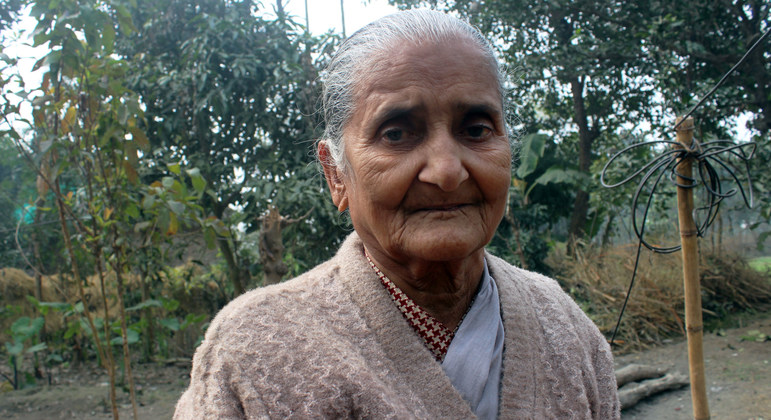Born into the privilege and comforts of a so called high-caste Brahmin family in Nepal, Ratna Khawas’s life changed drastically when she got married to someone outside her social class, in 1968.
She and her new husband moved to his home village in Belbari, where there were no toilets or handwashing facilities. “I got the shock of my life,” she said. “I had to go to the open field for defecation, as there were no toilets in the whole community.” That shock set her on what became a lifelong quest to improve sanitation for her and her neighbors.
Growing up in a wealthy family in Dharan, 40 miles west, and a world away from Belbari, young Ratna was encouraged to pursue her education. In 1962, she became the first young woman in the region to obtain her “School Leaving Certificate”, having passed a notoriously difficult exam, and went on to become a teacher at Kali High School. That’s when she met and fell in love with Kami Lal Khawas, a young man from an underprivileged community who had a good education.
“I was so much in love with him, as he was an educated person,” said Ratna. “I felt that was enough for me and we got married,” she said, and followed him back to his village as his wife.
‘I felt that my world had collapsed’
Everything about her new family was different: their habits, their cuisine, their culture. The adjustment was made even more difficult because her father-in-law refused to allow her to continue teaching. For him, a strong advocate of a patriarchal society, it was unimaginable for women in the community to step outside their household for any kind of income-generating work.
“I felt that my world had collapsed. I did not know what to do. I had nowhere to go, as the doors of my parents’ house were closed to me,” says Ratna, recalling the consequences of marrying outside her caste.
The most glaring challenge confronting Ratna in her new life was the complete absence of sanitation and hygiene facilities, which she knew were important for good health and personal dignity. Dharan, where she had lived as a girl, was a developing city where most of the houses had toilets. With its lack of such facilities, Belbari seemed a backward place to her.
“I tried to convince my husband to build a toilet in his house, but he refused to go against his family’s tradition,” she recalls. Ratna was frequently ridiculed by neighbors as an outsider and as someone “always talking about faeces and urine.”
A safe space
In 1975, after her father-in-law’s death, Ratna’s husband allowed his wife to participate in a women’s empowerment programme. After her training, she became a public health professional for the Belbari constituency, working for the family-planning division of the Ministry of Health.
Over the next ten years, Ratna visited 250 households in the community, educating women about reproductive health, sanitation and hygiene, nutrition, and other health topics.
Still, sanitation remained her top priority. Faced with opposition from her extended family, she was unable to build a toilet at home. In 1989, she rebelled and left the family home with her four children. They settled on a piece of land that was owned by her husband, where they built a latrine and then a home.
It wasn’t long before her husband joined her. Then her nephews started building toilets for their homes. Slowly, as they could afford it, other members of the community also began to install latrines, because they had learned that access to a toilet gave them a safe space to manage their sanitation needs.
Pushing the last mile
Life in Belbari now is a far cry from the situation Ratna found when the newlyweds arrived in the village over half a century ago. Today, with Ratna’s help and inspiration, nearly all of Belbari’s 250 households have toilets.
“My only wish now is to build toilets for the seven remaining households,” says Ratna. Her efforts have received financial support from Nari Bikash Sangh (Women’s Development Forum) and local government and technical support from UN-Habitat in Nepal, which has advocated for an end to open defecation. With the support of the office, 600,000 improved toilets have been built across the country and, in the past 10 years alone, UN-Habitat has contributed to nearly one-third of all the territory that is now free of open defecation.
“The biggest achievement was pushing the last mile,” says Sudha Shrestha, Chief Technical Advisor at UN-Habitat Nepal. “This was in the region of Terai, where the total toilet coverage was only 13 per cent. Together with the government, we achieved 100 per cent within four years.”
Despite her success so far, Ratna is not resting on her laurels, with so much that still needs to be done to improve sanitation, and end open defecation. “I will consider the campaign a success once the senior citizens and middle-aged men make it a habit to use toilets regularly,” she says. With support from the UN, Ratna’s dream may be realized the world over.




